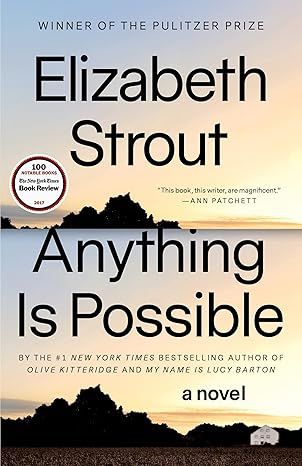Anything Is Possible: A Novel
4
-
19,323 ratings
NEW YORK TIMES BESTSELLER • An unforgettable cast of small-town characters copes with love and loss in this “compulsively readable” (San Francisco Chronicle) novel from the Pulitzer Prize–winning author of Olive Kitteridge and My Name is Lucy Barton
“This book, this writer, are magnificent.”—Ann Patchett
WINNER OF THE STORY PRIZE • A BEST BOOK OF THE YEAR: The New York Times, The Washington Post, USA Today, People, NPR, Entertainment Weekly, Newsday, The Seattle Times, Esquire, The Guardian, Kirkus Reviews, Publishers Weekly
In Anything Is Possible, Elizabeth Strout explores the whole range of human emotion through the intimate dramas of people struggling to understand themselves and others. Here are two sisters: One trades self-respect for a wealthy husband while the other finds in the pages of a book a kindred spirit who changes her life. A grown daughter longs for mother love even as she comes to accept her mother’s happiness in a foreign country. And Lucy Barton returns to visit her siblings after seventeen years of absence. Reverberating with the deep bonds of family, and the hope that comes with reconciliation, Anything Is Possible “confirms Strout as one of our most grace-filled, and graceful, writers” (The Boston Globe).
Kindle
$12.99
Available instantly
Audiobook
$0.00
with membership trial
Hardcover
$5.35
Paperback
$9.49
Ships from
Amazon.com
Payment
Secure transaction
ISBN-10
0812989414
ISBN-13
978-0812989410
Print length
304 pages
Language
English
Publisher
Random House Trade Paperbacks
Publication date
March 26, 2018
Dimensions
5.2 x 0.6 x 7.9 inches
Item weight
7.6 ounces
Popular Highlights in this book
This was the skin that protected you from the world—this loving of another person you shared your life with.
Highlighted by 2,878 Kindle readers
Everyone, she understood, was mainly and mostly interested in themselves.
Highlighted by 1,700 Kindle readers
She came to understand that people had to decide, really, how they were going to live.
Highlighted by 1,479 Kindle readers
We’re all just a mess, Angelina, trying as hard as we can, we love imperfectly, Angelina, but it’s okay.
Highlighted by 1,411 Kindle readers
Product details
ASIN :
B01LY2BN5I
File size :
3175 KB
Text-to-speech :
Enabled
Screen reader :
Supported
Enhanced typesetting :
Enabled
X-Ray :
Enabled
Word wise :
Enabled
Editorial Reviews
Review
“When Elizabeth Strout is on her game, is there anybody better? . . . This is a generous, wry book about everyday lives, and Strout crawls so far inside her characters you feel you inhabit them. . . . This is a book that earns its title. Try reading it without tears, or wonder.”—USA Today (four stars)
“Readers who loved My Name Is Lucy Barton . . . are in for a real treat. . . . Strout is a master of the story cycle form. . . . She paints cumulative portraits of the heartache and soul of small-town America by giving each of her characters a turn under her sympathetic spotlight.”—NPR
“These stories return Strout to the core of what she does more magnanimously than anyone else, which is to render quiet portraits of the indignities and disappointments of normal life, and the moments of grace and kindness we are gifted in response. . . . Strout hits the target yet again.”—The Washington Post
“In this wise and accomplished book, pain and healing exist in perpetual dependence, like feuding siblings.”—The Wall Street Journal
“Anything Is Possible confirms Strout as one of our most grace-filled, and graceful, writers.”—The Boston Globe
“Anything Is Possible keenly draws a portrait of a small town where options are few, where everyone’s business is everyone’s business, and where verdicts rendered while young follow you your whole life. . . . It joins a vast genre, and elevates it.”—Minneapolis Star Tribune
“Neither novel nor linked story collection strikes me as adequate terms to describe this book’s ingenious structure. . . . Strout’s sentence style fits these Midwestern folks and tales: straightforward while also seeming effortlessly lyrical, seeded both with humor and bitterness like many of our days.”—Milwaukee Journal Sentinel
“Stunning . . . Strout, always good, just keeps getting better.”—Vogue
“Full of searing insight into the darkest corners of the human spirit . . . Anything Is Possible is both sweeping in scope and incredibly introspective. That delicate balance is what makes its content so sharp and compulsively readable. . . . Strout’s winning formula . . . has succeeded once again. With assuredness, compassion and utmost grace, her words and characters remind us that in life anything is actually possible.”—San Francisco Chronicle
“While we recommend everything by the Pulitzer Prize-winning writer—like, say her recent book My Name Is Lucy Barton—this novel, which explores life’s complexities through interconnected stores, stands on its own. . . . It’s a joy to read a modern master doing her thing.”—Marie Claire
“If you miss the charmingly eccentric and completely relatable characters from Pulitzer Prize winner Elizabeth Strout’s best-selling My Name Is Lucy Barton, you’ll be happily reunited with them in Strout’s smart and soulful Anything Is Possible.”—Elle
“Strout pierces the inner worlds of these characters’ most private behaviors, illuminating the emotional conflicts and pure joy of being human, of finding oneself in the search for the American dream.”—NYLON
About the Author
Elizabeth Strout is the #1 New York Times bestselling author of Olive Kitteridge, winner of the Pulitzer Prize; Olive, Again, an Oprah’s Book Club pick; Anything Is Possible, winner of the Story Prize; My Name is Lucy Barton, longlisted for the Man Booker Prize; The Burgess Boys, named one of the best books of the year by The Washington Post and NPR; Abide with Me, a national bestseller; and Amy and Isabelle, winner of the Los Angeles Times Art Seidenbaum Award for First Fiction and the Chicago Tribune Heartland Prize. She has also been a finalist for the National Book Critics Circle Award, the PEN/Faulkner Award for Fiction, the International Dublin Literary Award, and the Orange Prize. Her short stories have been published in a number of magazines, including The New Yorker and O: The Oprah Magazine. Elizabeth Strout lives in New York City.
Read more
Sample
The Sign
Tommy Guptill had once owned a dairy farm, which he’d inherited from his father, and which was about two miles from the town of Amgash, Illinois. This was many years ago now, but at night Tommy still sometimes woke with the fear he had felt the night his dairy farm burned to the ground. The house had burned to the ground as well; the wind had sent sparks onto the house, which was not far from the barns. It had been his fault—he always thought it was his fault—because he had not checked that night on the milking machines to make sure they had been turned off properly, and this is where the fire started. Once it started, it ripped with a fury over the whole place. They lost everything, except for the brass frame to the living room mirror, which he came upon in the rubble the next day, and he left it where it was. A collection was taken up: For a number of weeks his kids went to school in the clothes of their classmates, until he could gather himself and the little money he had; he sold the land to the neighboring farmer, but it did not bring much money in. Then he and his wife, a short pretty woman named Shirley, bought new clothes, and he bought a house as well, Shirley keeping her spirits up admirably as all this was going on. They’d had to buy a house in Amgash, which was a run-down town, and his kids went to school there instead of in Carlisle, where they had been able to go to school before, his farm being just on the line dividing the two towns. Tommy took a job as the janitor in the Amgash school system; the steadiness of the job appealed to him, and he could never go to work on someone else’s farm, he did not have the stomach for that. He was thirty-five years old at the time.
The kids were grown now, with kids of their own who were also grown, and he and Shirley still lived in their small house; she had planted flowers around it, which was unusual in that town. Tommy had worried a good deal about his children at the time of the fire; they had gone from having their home be a place that class trips came to—each year in spring the fifth-grade class from Carlisle would make a day of it, eating their lunches out beside the barns on the wooden tables there, then tromping through the barns watching the men milking the cows, the white foamy stuff going up and over them in the clear plastic pipes—to having to see their father as the man who pushed the broom over the “magic dust” that got tossed over the throw-up of some kid who had been sick in the hallways, Tommy wearing his gray pants and a white shirt that had Tommy stitched on it in red.
Well. They had all lived through it.
This morning Tommy drove slowly to the town of Carlisle for errands; it was a sunny Saturday in May, and his wife’s eighty-second birthday was just a few days away. All around him were open fields, the corn newly planted, and the soybeans too. A number of fields were still brown, as they’d been plowed under for their planting, but mostly there was the high blue sky, with a few white clouds scattered near the horizon. He drove past the sign on the road that led down to the Barton home; it still said SEWING AND ALTERATIONS, even though the woman, Lydia Barton, who did the sewing and alterations had died many years ago. The Barton family had been outcasts, even in a town like Amgash, their extreme poverty and strangeness making this so. The oldest child, a man named Pete, lived alone there now, the middle child was two towns away, and the youngest, Lucy Barton, had fled many years ago, and had ended up living in New York City. Tommy had spent time thinking of Lucy. All those years she had lingered after school, alone in a classroom, from fourth grade right up to her senior year in high school; it had taken her a few years to even look him in the eye.
But now Tommy was driving past the area where his farm had been—these days it was all fields, not a sign of the farm was left—and he thought, as he often thought, about his life back then. It had been a good life, but he did not regret the things that had happened. It was not Tommy’s nature to regret things, and on the night of the fire—in the midst of his galloping fear—he understood that all that mattered in this world were his wife and his children, and he thought that people lived their whole lives not knowing this as sharply and constantly as he did. Privately, he thought of the fire as a sign from God to keep this gift tightly to him. Privately, because he did not want to be thought of as a man who made up excuses for a tragedy; and he did not want anyone—not even his dearly beloved wife—to think he would do this. But he had felt that night, while his wife kept the children over by the road—he had rushed them from the house when he saw that the barn was on fire—as he watched the enormous flames flying into the nighttime sky, then heard the terrible screaming sounds of the cows as they died, he had felt many things, but it was just as the roof of his house crashed in, fell into the house itself, right into their bedrooms and the living room below with all the photos of the children and his parents, as he saw this happen he had felt—undeniably—what he could only think was the presence of God, and he understood why angels had always been portrayed as having wings, because there had been a sensation of that—of a rushing sound, or not even a sound, and then it was as though God, who had no face, but was God, pressed up against him and conveyed to him without words—so briefly, so fleetingly—some message that Tommy understood to be: It’s all right, Tommy. And then Tommy had understood that it was all right. It was beyond his understanding, but it was all right. And it had been. He often thought that his children had become more compassionate as a result of having to go to school with kids who were poor, and not from homes like the one they had first known. He had felt the presence of God since, at times, as though a golden color was very near to him, but he never again felt visited by God as he had felt that night, and he knew too well what people would make of it, and this is why he would keep it to himself until his dying day—the sign from God.
Still, on a spring morning as this one was, the smell of the soil brought back to him the smells of the cows, the moisture of their nostrils, the warmth of their bellies, and his barns—he had had two barns—and he let his mind roll over pieces of scenes that came to him. Perhaps because he had just passed the Barton place he thought of the man, Ken Barton, who had been the father of those poor, sad children, and who had worked on and off for Tommy, and then he thought—as he more often did—of Lucy, who had left for college and then ended up in New York City. She had become a writer.
Lucy Barton.
Driving, Tommy shook his head slightly. Tommy knew many things as a result of being the janitor in that school more than thirty years; he knew of girls’ pregnancies and drunken mothers and cheating spouses, for he overheard these things talked about by the students in their small huddles by the bathrooms, or near the cafeteria; in many ways he was invisible, he understood that. But Lucy Barton had troubled him the most. She and her sister, Vicky, and her brother, Pete, had been viciously scorned by the other kids, and by some of the teachers too. Yet because Lucy stayed after school so often for so many years he felt—though she seldom spoke—that he knew her the best. One time when she was in the fourth grade, it was his first year working there, he had opened the door to a classroom and found her lying on three chairs pushed together, over near the radiators, her coat as a blanket, fast asleep. He had stared at her, watching her chest move slightly up and down, seen the dark circles beneath her eyes, her eyelashes spread like tiny twinkling stars, for her eyelids had been moist as though she had been weeping before she slept, and then he backed out slowly, quietly as he could; it had felt almost unseemly to come upon her like that.
But one time—he remembered this now—she must have been in junior high school, and he’d walked into the classroom and she was drawing on the blackboard with chalk. She stopped as soon as he stepped inside the room. “You go ahead,” he said. On the board was a drawing of a vine with many small leaves. Lucy moved away from the blackboard, then she suddenly spoke to him. “I broke the chalk,” she said. Tommy told her that was fine. “I did it on purpose,” she said, and there was a tiny glint of a smile before she looked away. “On purpose?” he asked, and she nodded, again with the tiny smile. So he went and picked up a piece of chalk, a full stick of it, and he snapped it in half and winked at her. In his memory she had almost giggled. “You drew that?” he asked, pointing to the vine with the small leaves. And she shrugged then and turned away. But usually, she was just sitting at a desk and reading, or doing her homework, he could see that she was doing that.
He pulled up to a stop sign now, and said the words aloud to himself quietly, “Lucy, Lucy, Lucy B. Where did you go to, how did you flee?”
He knew how. In the spring of her senior year, he had seen her in the hallway after school, and she had said to him, so suddenly open-faced, her eyes big, “Mr. Guptill, I’m going to college!” And he had said, “Oh, Lucy. That’s wonderful.” She had thrown her arms around him; she would not let go, and so he hugged her back. He always remembered that hug, because she had been so thin; he could feel her bones and her small breasts, and because he wondered later how much—how little—that girl had ever been hugged.
Tommy pulled away from the stop sign and drove into the town; right there beyond was a parking space. Tommy pulled in to it, got out of his car, and squinted in the sunshine. “Tommy Guptill,” shouted a man, and, turning, Tommy saw Griff Johnson walking toward him with his characteristic limp, for Griff had one leg that was shorter than the other, and even his built-up shoe could not keep him from limping. Griff had an arm out, ready to shake hands. “Griffith,” said Tommy, and they pumped their arms for a long time, while cars drove slowly past them down Main Street. Griff was the insurance man here in town, and he had been awfully good to Tommy; learning that Tommy had not insured his farm for its worth, Griff had said, “I met you too late,” which was true. But Griff, with his warm face, and big belly now, continued to be good to Tommy. In fact, Tommy did not know anyone—he thought—who was not good to him. As a breeze moved around them, they spoke of their children and grandchildren; Griff had a grandson who was on drugs, which Tommy thought was very sad, and he just listened and nodded, glancing up at the trees that lined Main Street, their leaves so young and bright green, and then he listened about another grandson who was in medical school now, and Tommy said, “Hey, that’s just great, good for him,” and they clapped hands on each other’s shoulders and moved on.
In the dress shop, with its bell that announced his entrance, was Marilyn Macauley, trying on a dress. “Tommy, what brings you in here?” Marilyn was thinking of getting the dress for her granddaughter’s baptism a few Sundays from now, she said, and she tugged on the side of it; it was beige with swirling red roses; she was without her shoes, standing in just her stockings. She said that it was an extravagance to buy a new dress for such a thing, but that she felt like it. Tommy—who had known Marilyn for years, first when she was in high school as a student in Amgash—saw her embarrassment, and he said he didn’t think it was an extravagance at all. Then he said, “When you have a chance, Marilyn, can you help me find something for my wife?” He saw her become efficient then, and she said yes, she certainly would, and she went into the changing room and came back out in her regular clothes, a black skirt and a blue sweater, with her flat black shoes on, and right away she took Tommy over to the scarves. “Here,” she said, pulling out a red scarf that had a design with gold threads running through it. Tommy held it, but picked up a flowery scarf with his other hand. “Maybe this,” he said. And Marilyn said, “Yes, that looks like Shirley,” and then Tommy understood that Marilyn liked the red scarf herself but would never allow herself to buy it. Marilyn, that first year Tommy worked as a janitor, had been a lovely girl, saying “Hi, Mr. Guptill!” whenever she saw him, and now she had become an older woman, nervous, thin, her face pinched. Tommy thought what other people thought, it was because her husband had been in Vietnam and had never afterward been the same; Tommy would see Charlie Macauley around town, and he always looked so far away, the poor man, and poor Marilyn too. So Tommy held the red scarf with the gold threads for a minute as though considering it, then said, “I think you’re right, this one looks more like Shirley,” and took the flowery one to the register. He thanked Marilyn for her help.
“I think she’ll love it,” Marilyn said, and Tommy said he was sure she would.
Read more
About the authors
Elizabeth Strout
Elizabeth Strout is the author of the New York Times bestseller Olive Kitteridge, for which she was awarded the Pulitzer Prize; the national bestseller Abide with Me; and Amy and Isabelle, winner of the Los Angeles Times Art Seidenbaum Award and the Chicago Tribune Heartland Prize. She has also been a finalist for the PEN/Faulkner Award and the Orange Prize in London. She lives in Maine and New York City.
Read more
Reviews
Customer reviews
4 out of 5
19,323 global ratings
Victoria M. Ward
5
Quietly wonderful.
Reviewed in the United States on July 13, 2024
Verified Purchase
Stories about some of the characters in "My Name is Lucy Barton". About sadness and desperation and the redemptive power of kindness.
Ceclila
5
OUR BEST OBSERVER OF HUMAN BEHAVIOR WRITING CONTEMPORARY FICTION TODAY
Reviewed in the United States on June 4, 2017
Verified Purchase
EXCERPT Interrelated stories by the most acute observer of human behavior writing fiction today.
BOOK REVIEW: ELIZABETH STROUT’S LUMINOUSSHORT-STORY COLLECTION, ‘ANYTHING IS POSSIBLE’
BY CECILIA M. FORD, PH.D.
Elizabeth Strout’s astonishing new collection of short stories, Anything Is Possible, reconfirms her status as the most acute observer of human behavior writing fiction today. While each story about the local people who live in or around Amgash, Illinois, is a stand-alone gem, they are interrelated, much the way people in any community are in reality. We live our parallel lives, sometimes interacting, sometimes not at all, and then meeting up again later. Some characters central to later stories are introduced in an earlier one through town gossip and idle observations or recollections that people make to each other—as we all do, all the time.
Amgash is the hometown of the central character of Strout’s last novel, My Name Is Lucy Barton, and she and her family also make appearances in this book. Lucy herself is a relative of Olive Kittredge, the main character of Strout’s eponymous book of linked stories, which won the Pulitzer Prize for fiction in 2009. It was also made into an acclaimed HBO series starring Frances McDormand.
Like those two previous books, Anything Is Possible has the stunning clarity and simplicity of Shaker furniture or a Thomas Eakins portrait, crafted with honesty and a sure hand. Strout has the uncanny ability to describe a character in a few simple sentences. The people in her stories come to life both as unique individuals as well as men and women you will recognize from your own experience.
Talking of a bitter woman whose life has turned out differently than she thought it would, a neighbor explains, “people need to feel superior to someone.” About another, Strout writes, “Life had simply not been what she thought it would be. Shelly had taken life’s disappointments and turned them into a house.”
Lucy Barton is one of the only people to have fled this small but not especially intimate community. These are people who harbor secrets, memories that shame them or thoughts they don’t think others will understand.
With many of Strout’s characters, what’s unsaid is often as important as what is said. Lucy’s cousin, a kind man named Abel Blaine, is one of the few other characters that left Amgash and did well, leaving their childhood of bitter poverty behind and starting a successful business. Now a grandfather, he reflects silently on his long marriage:
“After many years of marriage things get said, scenes occur, and there is a cumulative effect as well. All this sped through Abel’s heart, that the tenderness between husband and wife had long been attenuating and that he might have to live the rest of his life without it.”
Though Abel and Lucy have escaped small-town life and their deprived childhoods, he is aware of “how much one forgot but then lived with anyway—like phantom limbs.” Strout is a writer who intuitively understands the complex nature of how the past stays with us and how its scars are constantly reasserting themselves. Another character, a woman named Annie, reflects that “her own experience over the years now spread like a piece of knitting in her lap with different colored yarns—some dark—all through it.”
These dark threads provide an undercurrent of vulnerability to Strout’s characters. Their tenuous hold on what they have overcome—some, like Lucy’s brother Pete, not all that well—is a constant shadow that hovers nearby.
But the residents of Amgash are plain people despite the secrets of the dark past. Abel’s sister, Dottie, who with him endured desperate poverty as a child, now runs a bed-and-breakfast. She is divorced, often lonely, but “Dottie was not a woman to complain, having been taught by her decent Aunt Edna one summer—it seemed like a hundred years ago, and practically was—that a complaining woman was like pushing dirt beneath the fingernails of God, and this was an image that Dottie had never been able to fully dislodge.”
Elizabeth Strout is a Maine native, and all her previous books have been set either there or in New York, where she spends half her time. Amgash residents are much like the Maine people Strout writes about, though: small-town people living lives limited by geography, obligation, and habit. Yet, as the title of this collection suggests, they are frequently surprised by the turns their paths take and the things they learn about themselves as a result.
Often the characters are revealed through interior monologues as they reflect on these surprising turns. A particularly moving story examines the regret an old woman feels about the pain she has caused her favorite daughter (now middle-aged herself) by moving to Italy and marrying a younger man, after she endured a harsh marriage much longer than she wanted to. Strout writes, “And she could not tell her daughter that had she known what she was doing to her, to her dearest little Angel, she might not have done it. But this was life! And it was messy!”
Family secrets, with their attendant messes, abound. Pete Barton appears in a story in which he prepares for a rare visit from Lucy. In another, a neighbor, Tommy, drops by. He is an older man who had been the school custodian who had kindly let Lucy stay late at school so she could do her homework in the heated building—the Bartons had been so poor that they lived in an unheated garage. Tommy has long wondered about Pete and Lucy’s odd father, damaged by the War (World War II), assuming that he was responsible for the pain he sees in Pete. On this particular visit he has an insight as he watches Pete destroy a sign with a sledgehammer that Mrs. Barton had put up to advertise her small business as a seamstress. Tommy thinks, “Oh, it was the mother. She must have been the really dangerous one.”
Except for Lucy, who has become a well-known writer who lives in New York, the residents of Amgash live outwardly quiet lives but are filled with inner turmoil and conflict. Their stories are about the way average people attempt to cope with their bewilderment. About Tommy, Strout observes, “It seemed the older he grew—and he had grown old—the more he understood that he could not understand this confusing contest between good and evil, and that maybe people were not meant to understand things here on earth.”
Again and again, the people Strout writes about defy expectations—both theirs and others’. Dark secrets, hidden depth, and unexpected decency are woven throughout these elegant stories. “People surprise you,” one character observes. “Not just their kindness, but also their sudden ability to express things in the right way.” And Strout has the ability to portray the human condition with stunning clarity, expressed in just the right way. You will recognize these people, and yourself, in this book.
Read more
11 people found this helpful
Barbara Hinds
5
Another Winner
Reviewed in the United States on September 11, 2024
Verified Purchase
I have enjoyed each one of Elizabeth Strout’s book. This is no exception, even though I am generally not a fan of short stories. But because the characters reappear in different stories and their are relationships between them, I was engrossed in this book and the lives of the people, many I already knew from different books. If the reader is looking for thought-provoking dialogue and the magnitude of wonder found in an ordinary life, this is a fine book.
Read more
Abby
5
Strout is a genius
Reviewed in the United States on May 11, 2017
Verified Purchase
Review: ANYTHING IS POSSIBLE by Elizabeth Strout
I drove two hours to get there, splurging on a hotel in Boston for the chance to hear Her speak. My husband jokes I’m a stalker, but you can’t be arrested for reading every sentence someone published twice, right? It’s been said that Elizabeth Strout's genius lies in her “economy with words” and that is it exactly. Society's been drugging its women for years, she throws out casually in ANYTHING IS POSSIBLE, as if it isn’t a challenging sentence to construct.
This book dives into the later-lives of townspeople who made appearances in MY NAME IS LUCY BARTON. As a reader, this was thrilling because I so wanted more of Lucy and never imagined I would get it. At one point the narrative observes: Lucy Barton had her own shame; oh boy did she have her own shame. And she had risen right straight out of it. This sequel-of-sorts spends the majority of its time with people who did not.
Watching Strout on stage, I was captivated by her compassion. Her characters, always, are flawed. They embarrass themselves. They do terrible, terrible things. They occasionally get caught. And, yet, Strout sits beside them to hear their stories. To understand how they got there. To give them a voice. She isn’t at all concerned with plot, but she is very aware of what a reader needs. Is it time for levity? She’ll give you something like: Dottie didn't often say the word "penis", and she enjoyed it. Does someone need to catch a break? Strout knows it, and tells you so when her character says, “I'm sorry. But when someone's nice to me-- Oh God, it just kills me.” I especially love being there when a conclusion is drawn: I guess there's always a struggle between what to do and what not to do. Or, Everyone, she understood, was mainly and mostly interested in themselves. Or, To listen to a person is not passive.
Run to your local independent bookstore, or wherever it is you buy books, and try not to fall victim to the most common complaint of all, which Strout identifies as, "Life had simply not been what she thought it would be."
*Important reader’s note: Read MY NAME IS LUCY BARTON first. Both books are short; LUCY BARTON + ANYTHING IS POSSIBLE equals the reading time of one novel. Strout gets away with this because of her “economy with words.” It’s a whole story— maybe even a hundred whole stories— it’s just handed over with efficiency.
Read more
18 people found this helpful
Roger Brunyate
5
Lucy Barton's Old Neighbors
Reviewed in the United States on June 12, 2017
Verified Purchase
In the first of the nine stories that comprise this loosely-structured novel, the old former janitor of a school in rural Illinois remembers Lucy Barton, the youngest child of a dirt-poor family who escaped to New York and found success as a writer. She has just come out with a memoir, which one gathers is Strout's miracle novel, MY NAME IS LUCY BARTON. Lucy is mentioned in two or three of the other stories also, and in one, "Sisters," she actually appears, her first return in decades. You do not have to have read the earlier novel to enjoy this one, but it offers a curious payback for those that have. For most of LUCY BRTON, you were waiting for the shoe to drop about what happened to Lucy in her childhood; one of Strout's great strokes of grace came in letting the footwear fall very gently, hinting enough to satisfy but leaving it at that. Here, though, she is much more specific; the almost feral background of Lucy and her family comes across with near-Gothic shock.
Too much so? I might have been disappointed, were it not that the distinctive quality of the earlier book—its grace—is found in abundance here also. Strait returns to the structure of her Pulitzer Prize-winning OLIVE KITTERIDGE, depicting a loose community of interconnected characters through stories, each with its own focus and conclusion, but with the same figures mentioned in others. But the New England orneriness that had soured the earlier collection for me is here replaced by a Midwestern warmth. It is not sappy—many of the characters are edgy and awkward, often elderly too—but there is also a gentleness of understanding that reminds me of Kent Haruf or even Marilynne Robinson.
One example must suffice. Tommy Guptill, the janitor in the opening story, once owned a successful dairy farm, until his inheritance was wiped out by a disastrous fire. But Tommy has a secret that he has not shared even with his wife:
Privately, he thought of the fire as a sign from God to keep this gift tightly to him. Privately, because he did not want to be thought of as a man who made up excuses for a tragedy; and he did not want anyone—not even his dearly beloved wife—to think he would do this. But he had felt that night, while his wife kept the children over by the road—he had rushed them from the house when he saw that the barn was on fire—as he watched the enormous flames flying into the nighttime sky, then heard the terrible screaming sounds of the cows as they died, he had felt many things, but it was just as the roof of his house crashed in, fell into the house itself, right into their bedrooms and the living room below with all the photos of the children and his parents, as he saw this happen he had felt— undeniably—what he could only think was the presence of God, and he understood why angels had always been portrayed as having wings, because there had been a sensation of that—of a rushing sound, or not even a sound, and then it was as though God, who had no face, but was God, pressed up against him and conveyed to him without words—so briefly, so fleetingly— some message that Tommy understood to be: It’s all right, Tommy.
Few episodes in the book share the drama of this one, which takes place well before the novel opens. But the quiet moment with which the story ends, when Tommy finally shares his secret, is utterly typical and, I feel, even more amazing:
And then Tommy understood: that what he had kept from her their whole lives was, in fact, easily acceptable to her, and what he would keep from her now—his doubt (his sudden belief that God had never come to him)—was a new secret replacing the first. He took his hand from hers. “You might be right,” he said. A paltry thing he added, but it was true: He said, “I love you, Shirley.” And then he looked at the ceiling; he could not look at her for a moment or two.
I read the first few stories in growing wonder and deepening joy. Later, Strout expands her rural focus, including a wealthy arts patron, a successful actress, and a company director among her characters, and moving her setting to a small city, northern New England, or the Ligurian coast. I began to fear that the intensity of the opening might become dissipated. But, as with MY NAME IS LUCY BARTON, no matter how far the people travel they never forget the simplicity of their roots. And the last story of all ends with a spiritual return so magical that I can only urge you to savor Strout's book slowly and wait for it.
Read more
31 people found this helpful
Top Elizabeth Strout titles
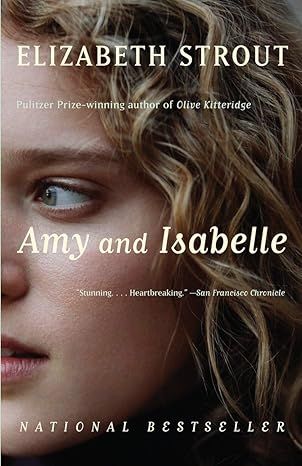
Amy and Isabelle: A novel
4.3
-
9,403
$3.34
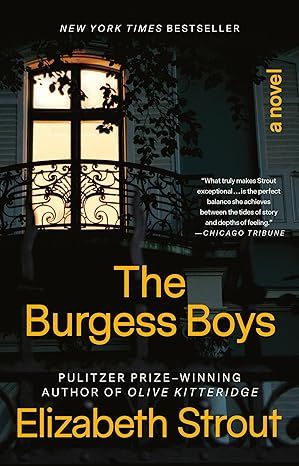
The Burgess Boys: A Novel
4.1
-
11,063
$2.11

Oh William!: A Novel
4.2
-
22,498
$5.04

Lucy by the Sea: A Novel
4.3
-
18,461
$4.00
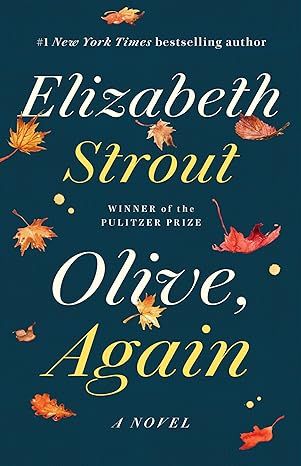
Olive, Again: A Novel (Olive, 2)
4.4
-
24,861
$9.76
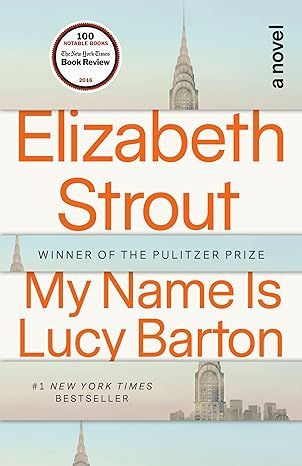
My Name Is Lucy Barton: A Novel
3.8
-
36,168
$7.94
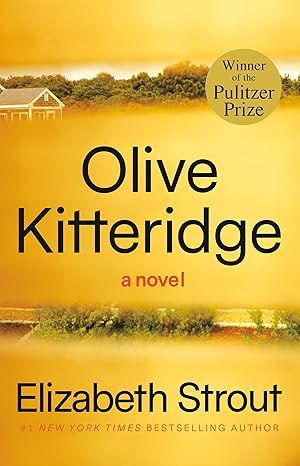
Olive Kitteridge
4.2
-
30,647
$9.49
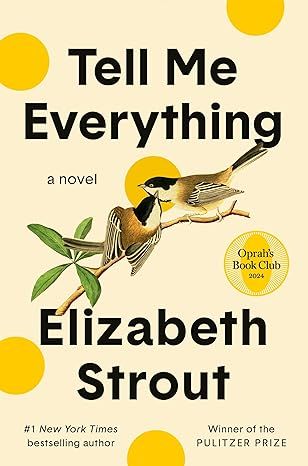
Tell Me Everything: Oprah's Book Club: A Novel
4.5
-
2,665
$14.99
Best Sellers

The Tuscan Child
4.2
-
100,022
$8.39

The Thursday Murder Club: A Novel (A Thursday Murder Club Mystery)
4.3
-
155,575
$6.33

Sapiens: A Brief History of Humankind
4.6
-
140,302
$13.49

The Butterfly Garden (The Collector, 1)
4.3
-
88,556
$9.59

Things We Hide from the Light (Knockemout Series, 2)
4.4
-
94,890
$11.66

The Last Thing He Told Me: A Novel
4.3
-
154,085
$2.99

The Perfect Marriage: A Completely Gripping Psychological Suspense
4.3
-
143,196
$9.47

The Coworker
4.1
-
80,003
$13.48

First Lie Wins: A Novel (Random House Large Print)
4.3
-
54,062
$14.99

Mile High (Windy City Series Book 1)
4.4
-
59,745
$16.19

Layla
4.2
-
107,613
$8.99

The Locked Door
4.4
-
94,673
$8.53
